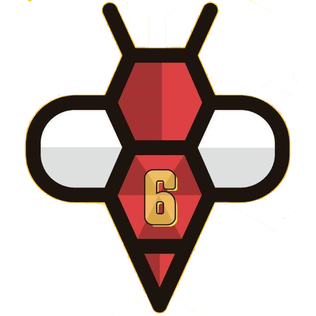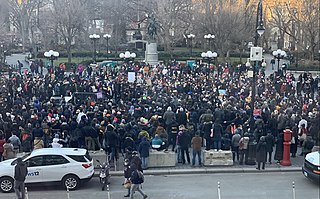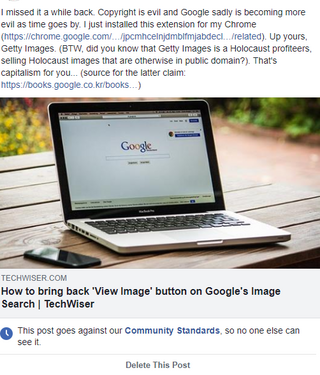Related Research Articles

Xenophobia is the fear or dislike of anything which is perceived as being foreign or strange. It is an expression which is based on the perception that a conflict exists between an in-group and an out-group and it may manifest itself in suspicion of one group's activities by members of the other group, a desire to eliminate the presence of the group which is the target of suspicion, and fear of losing a national, ethnic, or racial identity.
esea contemporary, formerly the Centre for Chinese Contemporary Art, is a contemporary art gallery based in Manchester, England. It is located on Thomas Street in Manchester's Northern Quarter in the renovated part of the Smithfield Market Hall.

British Chinese are people of Chinese – particularly Han Chinese – ancestry who reside in the United Kingdom, constituting the second-largest group of Overseas Chinese in Western Europe after France.

British Asians are British citizens of Asian descent. They constitute a significant and growing minority of the people living in the United Kingdom, with 6.9% of the population identifying as Asian/Asian British in the 2011 United Kingdom census. This represented a national demographic increase from a 4.4% share of UK population in 2001.
ESEA may refer to:

Asian Australians are Australians of Asian ancestry, including naturalised Australians who are immigrants from various regions in Asia and descendants of such immigrants. At the 2021 census, the proportion of the population identifying as Asian amounted to approximately 17.4 percent with breakdowns of 6.5 percent from Southern and Central Asia, 6.4 percent from North-East Asia, and 4.5 percent from South-East Asia.
Racism in Asia is multi-faceted and has roots in events that have happened from centuries ago to the present. Racism in Asia may occur from nation against nation, or within each nation's ethnic groups, or from region against region.
Racism in Canada traces both historical and contemporary racist community attitudes, as well as governmental negligence and political non-compliance with United Nations human rights standards and incidents in Canada. Contemporary Canada is the product of indigenous First Nations combined with multiple waves of immigration, predominantly from Europe and in modern times, from Asia.
Some communities on the social news site Reddit are devoted to explicit, violent, or hateful material, and have been the topic of controversy. Controversial Reddit communities sometimes receive significant media coverage.

Racism in the United Kingdom refers to negative attitudes and views on race or ethnicity within the viewpoints of groups or individuals or existing systemically in the United Kingdom. The extent and the targets of racist attitudes in the United Kingdom have varied over time. It has resulted in cases of discrimination, riots and racially motivated murders. Racism was uncommon in the attitudes and norms of the British class system during the 19th century, in which race mattered less than social distinction: an African tribal chief was unquestionably superior to an English costermonger. Use of the word "racism" became more widespread after 1936, although the term "race hatred" was used in the late 1920s by sociologist Frederick Hertz. Laws were passed in the 1960s that specifically prohibited racial segregation.
The Asian American Movement was a sociopolitical movement in which the widespread grassroots effort of Asian Americans affected racial, social and political change in the U.S., reaching its peak in the late 1960s to mid-1970s. During this period Asian Americans promoted anti-war and anti-imperialist activism, directly opposing what was viewed as an unjust Vietnam war. The American Asian Movement (AAM) differs from previous Asian American activism due to its emphasis on Pan-Asianism and its solidarity with U.S. and international Third World movements such as the Third World Liberation Front.
Asian New Zealanders are New Zealanders of Asian ancestry . At the 2013 census, 471,708 New Zealanders declared that they had an Asian ancestral background. This represents about 12% of all responses.

6ixBuzzTV Ltd., doing business as 6ixBuzz, is a Canadian media platform and record company based in Toronto, Ontario.

The COVID-19 pandemic was first reported in the city of Wuhan, Hubei, China, in December 2019. The origins of the virus have subsequently led to an increase in acts and displays of Sinophobia, as well as prejudice, xenophobia, discrimination, violence, and racism against people of East Asian and Southeast Asian descent and appearance around the world. With the spread of the pandemic and formation of hotspots, such as those in Asia, Europe, and the Americas, discrimination against people from these hotspots has been reported.

Stop Asian Hate is a slogan and name of a series of demonstrations, protests, and rallies against violence against Asians, Asian Americans, and others of Asian descent. They were held across the United States in 2021 in response to racial discrimination against Asian Americans relating to the COVID-19 pandemic.
Dr Diana Yeh is a British Chinese sociologist, writer, curator, arts worker, and a prominent social and political activist in the United Kingdom. She is regarded as a leading expert on the history of British Chinese artists, and on racism and anti-racism, particularly in relation to Chinese diasporas. Yeh is a regular commentator on these issues, appearing frequently in interviews for international's news outlets.

Yao Pan Ma, a 61-year-old Chinese American, was attacked on April 23, 2021, and died on December 31, 2021 as a result of an attack by 49-year-old African American Jarrod Powell in East Harlem, New York City, United States. The racist attack drew national attention as part of a rise in anti-Asian hate crimes in America.

Facebook or Meta Platforms has been criticized for its management of various content on posts, photos and entire groups and profiles. This includes but is not limited to allowing violent content, including content related to war crimes, and not limiting the spread of fake news and COVID-19 misinformation on their platform, as well as allowing incitement of violence against multiple groups.
In the Western world or in non-Asian countries, terms such as "racism against Asians" or "anti-Asian racism" are typically used in reference to racist policies, discrimination against, and mistreatment of Asian people and Asian immigrants by institutions and/or non-Asian people.
Mei Mac is a British actress and theatre maker. For her performance in the stage adaptation of My Neighbour Totoro, she was nominated for a Laurence Olivier Award.
References
- 1 2 "ESA Scotland". ESA Scotland. Retrieved 2022-09-16.
- ↑ "Yellow Earth Theatre". Yellow Earth Theatre. Retrieved 2022-09-16.
- ↑ Aspinall, P. J. (2003-06-01). "Who is Asian? A category that remains contested in population and health research". Journal of Public Health. 25 (2): 91–97. doi:10.1093/pubmed/fdg021. ISSN 1741-3842. PMID 12848395.
- 1 2 3 Yeh, Diana (2021). "Becoming British East Asian and Southeast Asian". British Journal of Chinese Studies (11). doi: 10.51661/bjocs.v11i0.131 .
- ↑ "Rallying banners: How did the terms 'ESEA' and 'Asian American' take root?". besea.n. Retrieved 2022-09-16.
- ↑ "East and Southeast Asians: Documenting a Category in the Making". Public Data Lab. Retrieved 2022-10-01.
- ↑ Bao, Hongwei (2021-09-07). "Envisioning and Enacting a Pan-Asian Political Identity: The Cultural Politics of the First 'Stop Asian Hate UK' Protests". The Sociological Review. doi: 10.51428/tsr.crwi5533 . S2CID 239654703.
- ↑ "Hate Crime Data". End Violence and Racism Against ESEA Communities. Retrieved 2022-09-16.
- ↑ "Network | ESEA Online Community Hub". ESEA Community Hub. Retrieved 2022-09-16.
- ↑ "Map of ESEA Organisations". End Violence and Racism Against ESEA Communities. Retrieved 2022-09-16.
- ↑ Chan, Emily (22 January 2023). "How ESEA Sisters Found Community Amid A Wave Of Anti-Asian Hate". British Vogue . Retrieved 22 January 2023.
- ↑ "B E A T S". wearebeats.org.uk. Retrieved 2022-09-15.
- ↑ Bao, Hongwei (July 20, 2021). "A pilot study on East and Southeast Asian (ESEA) people's experience of racism and hate crime in the UK during the COVID-19 pandemic". Centre for Contemporary East Asian Cultural Studies.
- ↑ "How the UK's East and South-East Asian communities are fighting COVID-related violence". openDemocracy. Retrieved 2022-09-16.
- ↑ Tsjeng, Zing (September 27, 2021). "'We Want to Share Our Joy' – The Women Behind the UK's First ESEA Heritage Month". Vice. Retrieved September 15, 2022.
- ↑ Phillips, Ronke (October 7, 2021). "Covid racism fuels 80% rise in hate crimes against east and south east Asians in London". ITV News. Retrieved September 15, 2022.
- ↑ Mohdin, Aamna (August 9, 2022). "UK helpline launched for east and south-east Asian victims of racism". The Guardian. Retrieved September 16, 2022.
- ↑ Owen, Sarah (July 22, 2020). Hate Crimes: South and East Asian Communities. Hansard Volume 678. Retrieved September 16, 2022.
- ↑ "Voice ESEA - Petition". Voice ESEA. Retrieved 2022-09-16.
- ↑ "News - Covid-related racism has traumatised East and South East Asian communities, study finds - University of Nottingham". www.nottingham.ac.uk. Retrieved 2022-09-16.
- ↑ UCL (2020-10-03). "We are not the virus". UCL Grand Challenges. Retrieved 2022-09-16.
- ↑ "Discrimination and racism during the COVID-19 outbreak – a community response". LSHTM. Retrieved 2022-09-16.
- ↑ Iqbal, Nosheen (May 9, 2021). "Celebrities unite to back #StopAsianHate campaign". The Guardian. Retrieved September 16, 2022.
- ↑ Lai*, Ching Kaitlyn (2022-05-27). "6 Asian Women On Racism And The Impact Of The #StopESEAHate Campaign A Year On". ELLE. Retrieved 2022-09-16.
- ↑ "Artists call for 'white-run' UK Chinese gallery to be defunded in racism row". the Guardian. 2021-06-21. Retrieved 2022-09-16.
- ↑ "Asian Leadership Collective". Asian Leadership Collective. Retrieved 2022-09-16.
- ↑ "besea.n". besea.n. Retrieved 2022-09-16.
- ↑ "B E A T S". wearebeats.org.uk. Retrieved 2022-09-16.
- ↑ "ABOUT US". CARG. Retrieved 2022-09-16.
- ↑ "Ways to access support for ESEA racism – China Exchange". 17 March 2021. Retrieved 2022-09-16.
- ↑ "Home". daikon* zine. Retrieved 2022-09-16.
- ↑ "Don't Call Me Oriental". Don'tCallMeOriental. Archived from the original on 2022-09-03. Retrieved 2022-09-16.
- ↑ "East and Southeast Asians for Labour". East and Southeast Asians for Labour. Retrieved 2022-10-26.
- ↑ "ESA.NE". ESA.NE. Retrieved 2022-09-16.
- ↑ "EdiUniCorn - UoE ESEA Queer Society (@uoe_eseaqueersoc) • Instagram photos and videos". www.instagram.com. Retrieved 2022-09-16.
- ↑ "End Violence and Racism Against ESEA Communities". End Violence and Racism Against ESEA Communities. Retrieved 2022-09-16.
- ↑ "ESEA Archives Book Club (@esea.archives) • Instagram photos and videos". www.instagram.com. Retrieved 2022-09-16.
- ↑ "esea contemporary". esea contemporary. Retrieved 10 January 2023.
- ↑ Chow, Vivienne (9 January 2023). "A Prominent Asian Art Center in the U.K. Drops 'Chinese' From Its Name Amid Growing Geopolitical Tensions". Artnet. Retrieved 10 January 2023.
- ↑ "ESEA Green Lions (@esea.green.lions) • Instagram photos and videos". www.instagram.com. Retrieved 2023-01-22.
- ↑ "Green Lunar New Year". Museum of the Home. Retrieved 22 January 2023.
- ↑ Sarah, Shaffi (23 January 2023). "First UK festival for east and south-east Asian writing announced". The Guardian. Retrieved 24 January 2023.
- ↑ "ESEA Lit Fest". ESEA Lit Fest. Retrieved 24 January 2023.
- ↑ "ESEA music - Every Sound Every Action". www.eseamusic.co.uk. Retrieved 2022-09-16.
- ↑ "ESEA Online Community Hub". ESEA Community Hub. Retrieved 2022-09-16.
- ↑ "ESEA Publishing Network (@eseapn) • Instagram photos and videos". ESEA Publishing Network. Retrieved 2023-01-06.
- ↑ "Esea.Sisters (@esea.sisters) • Instagram photos and videos". www.instagram.com. Retrieved 2022-09-16.
- ↑ "ESEA Young Londoners (@esealondonyouth) • Instagram photos and videos". www.instagram.com. Retrieved 2022-09-16.
- ↑ "Colston project aims to create 'grassroots' change in Bristol". BBC News. 2021-08-28. Retrieved 2022-09-16.
- ↑ "Every Asian Voice (@everyasianvoice) • Instagram photos and videos". www.instagram.com. Retrieved 2022-09-16.
- ↑ "FoundlingProductions (@foundlingproductions) • Instagram photos and videos". www.instagram.com. Retrieved 2022-09-16.
- ↑ "Hackney Chinese | Home". Hackney Chinese Community Services. Archived from the original on 2022-09-15. Retrieved 2022-10-01.
- ↑ "Half East Records (@halfeastrecords) • Instagram photos and videos • Instagram photos and videos". www.instagram.com. Retrieved 2023-11-01.
- ↑ "ABOUT". Hidden Keileon. Retrieved 2022-09-16.
- ↑ "Horizons Collective". Horizons Collective. Retrieved 2023-03-04.
- ↑ "Kakilang - Southeast and East Asian Contemporary Arts". Kakilang. Retrieved 2023-01-07.
- ↑ "Chinese Arts Now". Chinese Arts Now. Retrieved 2022-09-16.
- ↑ "About Us – KANLUNGAN".
- ↑ "kindredpacket". kindredpacket. Retrieved 2022-09-16.
- ↑ "Home". Liverpool Esea Netwo. Retrieved 2022-09-16.
- ↑ "HOME". moongateproductions. Retrieved 2022-09-16.
- ↑ "New Earth Theatre". New Earth Theatre. Retrieved 2022-09-16.
- ↑ "On Your Side". On Your Side. Retrieved 2022-10-10.
- ↑ "Papergang Theatre". Papergang Theatre. Retrieved 2022-09-16.
- ↑ "Home | Racism Unmasked Edinburgh". Racism Unmasked Edin. Retrieved 2022-09-16.
- ↑ "Home". remember-resist.co.uk. Retrieved 2022-09-16.
- ↑ "Rising Waves". New Earth Theatre. Retrieved 10 June 2023.
- ↑ "SOAS dis-Orient Society (@soasdisorient) • Instagram photos and videos". www.instagram.com. Retrieved 2022-09-16.
- ↑ "Southeast and East Asian Centre". Southeast and East Asian Centre. Retrieved 2022-09-16.
- ↑ http://www.tanstopics.com
- ↑ "Empowering East and Southeast Asian officials was a highlight: Civil Service Race Forum looks back on 2022". Civil Service World. 2022-12-13. Retrieved 2022-12-15.
- ↑ "Voice ESEA". Voice ESEA. Retrieved 2022-09-16.